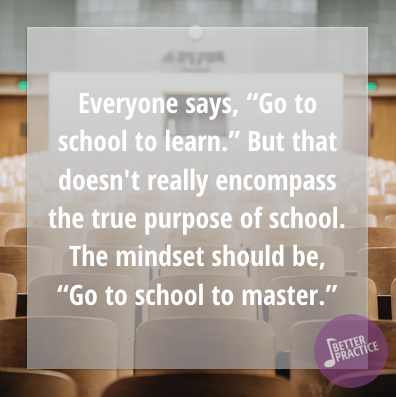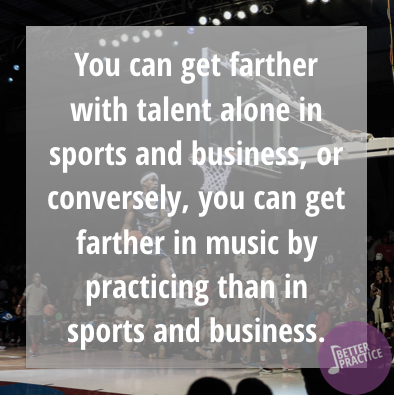Everyone says, “Go to school to learn.” But that doesn’t really encompass the true purpose of school. The mindset should be, “Go to school to master.”
For this article’s sake, we’re thinking of learning as just the absorbing of facts. Anyone can learn by going to lecture and sitting, or reading articles online. You can “learn” how to backflip by watching video after video and never actually trying it. Anyone can learn how to do something, but can they actually do it when the time comes?
Mastery, on the other hand, is what we are referring to as the ability to apply these learned skills to real-life scenarios at real-life speed. Isn’t this the goal for anything you learn? But mastery doesn’t come through simply absorbing information – it comes through practice. Whether it’s math, drawing, sports, or music – you need to put things into practice in order to master them. This is usually what you’re doing with homework, sports drills, class exercises, and music practice.

Learning vs. Mastering
How many times have you heard a child complain about their homework (“Why do I have to do all of this when I already know how to do it?”) then fail to get 100% on the test? Maybe it’s because they didn’t really know it as well as they thought, or because they made dumb mistakes and/or ran out of time. Either way, they hadn’t mastered it, or had enough practice to apply it in real life, in real time. They might have remembered all the steps from lecture, but wasn’t able to apply it correctly or at the right speed. Homework is the practice needed here to develop accuracy, speed, and depth in understanding – or what’s needed to get 100%.
Take Steph Curry as an example. He’s thought to be one of the best shooters in basketball history, but he still practices shooting 400-600 times a day. He already knows how to shoot – he just has to keep the skill locked in so deeply that he can do it in a moment’s notice (like during a game).
How Important Is Mastery In Music?
A recent study showed that when compared to talent, practice is more important in music than in sports and business. In other words, you can get farther with talent alone in sports and business, or conversely, you can get farther in music by practicing than in sports and business.
Quite simply, with music, practice matters most. As a parent, if you want your child to succeed in music, practice MUST be a priority. If you’re making the investment in time and money for lessons but not putting in a similar or greater investment in practice, then you’re probably not getting the results you expected.
So what does practicing to master mean for music? It means practicing to develop accuracy, speed and depth – not just to play it through and get it right once or twice. That’s like getting one multiplication problem right on a sheet of 50 and saying you know multiplication. Would you accept that from your child in school?

Why Do We Need To Focus On Mastery In Music?
With school, your child has math class everyday. This includes lectures (learning) but also class exercises and homework to continuing practicing at home. In sports, you learn techniques or moves, then you do drills to practice them. On top of that, you constantly have practice games putting these moves into action in real time. Private music lessons however, seem to (for the most part) be stuck in a traditional model of lessons once a week, and then the student is all alone at home to figure out practice – without feedback until the next week. This model makes it really hard to succeed, and really easy to fail (and/or lose motivation and quit).
How to make HOME a great practice environment
It’s hard to fit in the time (not to mention expensive) to provide ‘guided practice’ sessions for your child between lessons (although there are teachers who offer this). The truth is, one 30-60min lesson every week is much too short to include any ‘practice’ time within it. Unless the lesson model changes drastically, mastery is expected to happen at home for music.
Here are a couple ways to make your home practice-friendly:
- Not have the instrument in same room as distracting things or things that might interfere with practice time (The most common is TV, but I’ve seen many homes where the keyboard is set up in the ‘game’ or ‘fun’ room – filled with toys, legos, and art supplies. Young children just can’t stop eyeing the toys, asking ‘When are we done?’ and running off the bench to show me their newest toy.).
- Have the instrument easily accessible, readily available, and visible. Remember the saying: “out of sight, out of mind”. Having the practice space in a more ‘in-your-face’ area instead of hidden away in a back room, or keeping instruments out rather than stored in a hidden area can remind and encourage students to practice more often. And, people are more likely to do something when there are less steps to get to it.
- Increase your child’s chance of success with a practice platform (like Better Practice!) that enables your child to ask their teacher questions during practice, send recordings for feedback, and engage with other music students throughout the week. Give them something to measure and track their progress and tools to accelerate their mastery.
Here are some other articles that can help:
- Staying involved for busy music parents
- Understanding your role as a music parents
- Parents: You may be asking your child the wrong question
- Spotlight: 200-Day Practice Streak
###Better Practice helps students that want to do more than just learn. If you’re committed to taking the time to practice, you might as well make the time productive and effective. Better Practice has numerous practice tools to make each session meaningful and also employs proven learning strategies like spaced repetition and self-regulated learning. Try it out the best music practice tool available.